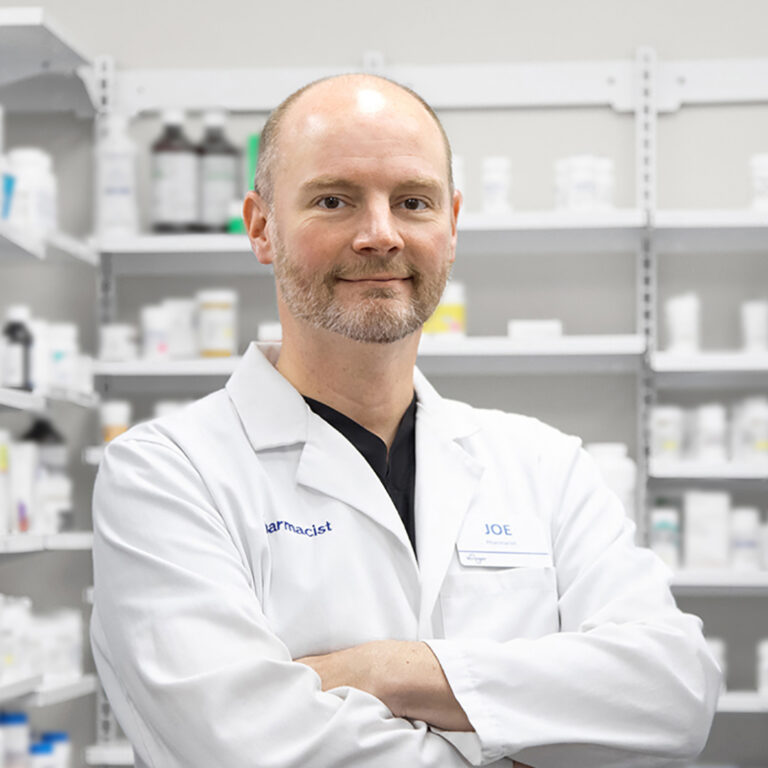
Education
- Doctor of Pharmacy from South University in Savannah, GA
- Bachelor’s degrees in chemistry and biochemistry from Kennesaw State University in Kennesaw, GA
Resume
- 7 months as pharmacy manager at Kroger #431
- 2 years as pharmacy manager at Kroger in Marietta, GA
- 5 years as a clinical pharmacist at Anthem/Ingenio Rx
- 4 years as a health and wellness pharmacy manager at Walmart in Atlanta Division
- 4 years as pharmacy manager at Publix
- 3 years as a pharmacy intern at Publix
- 5 years as a pharmacy technician at Publix
Years in pharmacy
Praise from customers
“Joseph specializes in customer care and ensures everyone is taken care of. He’s very sincere in helping his patients, ensures quality consultations, and goes out of his way to take the time patients need. The amount of empathy he displays—no matter how busy the pharmacy is—is amazing.”
“When Joseph moved pharmacies, within Kroger, the whole community wonders where he is. Patients follow him because he shines.”
“One time my son needed his prescription filled and the pharmacy was on holiday hours. Joseph stayed the extra few minutes to make sure my son was taken care of. He used his personal time to walk us through all of the medication information, on top of saving us money.”
On the first day of every month, Joseph Peter Stroh III, Pharm.D., would see his grandmother receive her Social Security check, head to the bank, and then stop at the local pharmacy so she could pick up her prescriptions.
Dr. Stroh recalls how the pharmacist on duty always made sure his grandmother had what she needed—even when money was tight. “They took excellent care of her,” he says. “If there was money remaining, I got to sit at the soda fountain and have a Cherry Vanilla Coke while we waited for them to fill her medication.”
Those moments are what he considers his “origin story,” or how he first began to associate the pharmacy with positive memories. “Those happy memories stuck with me,” he says, “and I knew I wanted to be a force for good in my community, caring for patients just like that pharmacist took care of my grandmother.”
Years later, with his mother in the hospital for serious health issues and the simpler days of his childhood behind him, he once again found himself closely connected to pharmacy.
“While my mom was in the hospital… the only person who ever had time to answer any questions or speak to me was a clinical pharmacist,” he explains. “I had lost sight of that dream of being a pharmacist when another pharmacist reminded me of the power of this profession. My passion was reignited.”
Today, Dr. Stroh is a pharmacist at Kroger #431 in Roswell, Georgia. It’s there that he continues to create a welcoming environment for his patients, just as the pharmacists who helped his grandmother and mother did.
“I want to make sure that even with the busyness that we experience in retail or the crazy hectic patient load that we might see in clinical that nobody gets lost in the shuffle,” he says. “When a patient is in our pharmacy or on the phone with us, they should feel like they are the only patient in the world.”
It’s this personalized approach that led Dr. Stroh to be named a 2023 Best of the Best Pharmacy Award winner. Here, we speak with the Georgia-based pharmacist about how he tries to offer individualized care to each and every one of his patients.
Tell us about getting your start in pharmacy.
I was working in a grocery store, and I went to the pharmacy department and basically begged the men who would become my future mentors—Marc Rutherford and Tom Saxton—to become a technician. I went over daily to ask if there was anything I could help with or learn until one day they hired me as a tech.
After receiving my degree, I worked in a clinical position at a pharmacy benefits manager, where I was in charge of reaching out to patients who were on 12 or more medications and had multiple pharmacies and multiple doctors. I worked with their providers to help them achieve better care.
How has that experience helped in your current role?
It’s important that we look at a patient’s total healthcare need as opposed to, “Oh, we just filled this prescription,” or, “Oh, we just filled these nine prescriptions.” Because I guarantee that the person who has those nine prescriptions needs clinical intervention.
I use the relationships that I build with my patients to make them more comfortable with opening up to me about things that they need. I can lead that patient in a way that they’re comfortable to a better health outcome because they trust me—because I’ve shown them that they’re family.
Can you tell us more about how you provide these clinical interventions?
When I review a patient’s profile, instead of just checking the prescription and pushing it into a bag, I try to associate the patient’s name with their treatment and make sure that the patient knows that I know their name.
Kroger has a really great clinical platform that allows us to integrate some clinical care, but I try to take it to the next level. I want to make sure that even if I’m not there, the notes are there. I don’t want people to feel like they just have to use an app to refill their prescriptions. I want them to know that if they have questions, they can come to me—and that all starts with the relationship and making sure they feel empowered.
I know that we’re going toward a more holistic approach toward health—at least, that’s my goal. But how do we get there? How do we bridge those gaps? I feel it’s that human connection. It’s speaking with somebody. It’s knowing their name. It’s making sure that their refills are taken care of. It’s being more than a number.
Why is it important to go that extra step?
It’s important that we are the last line of defense in the pharmacy. We can be advocates for patients and speak out against increasing healthcare costs. There are so many patients who will leave medication at the pharmacy—which they may desperately need—just because they can’t afford it, and that is just a shame. It’s an unacceptable outcome. I try to improve compliance, adherence, and outcomes through excellent patient care—and a lot of that does come down to cost.
As a pharmacist, what can you do to help with medication costs?
There are many challenges in the healthcare system, and a lot of the complexities arise for patients when they don’t understand their coverage. I can help by taking alternative avenues, such as running prescription discount cards.
Their insurance may have a $15 copay for a medication, but the discount card price is $8. You’ve just saved them enough for a little bit more groceries or a meal from Chick-fil-A.
Why is helping customers save so important?
Patients are going to be more likely to come back because they know about the cost savings and they don’t have to concern themselves with whether or not they have to make a decision about food or meds.
Having a patient who doesn’t have to worry about the cost of their medicine improves adherence and compliance. Compliance is doing something because you’re told to, but adherence is having good behavior moving forward. A discount card can remove barriers to healthcare. I cannot tell you how important it is to tear these barriers down.
What advice do you have for those just starting out in pharmacy?
Find what makes you a good pharmacist and the part that you are passionate about. Hang on to that and let it be your guiding light as you go forward. It’s going to get you through your darkest days. You may have a day where you feel like nothing works; then, you have to look back and find the reason that you got into pharmacy to begin with. If that’s at the forefront of your practice, you’ll never have a bad day in pharmacy.
Praise from customers
“Joseph specializes in customer care and ensures everyone is taken care of. He’s very sincere in helping his patients, ensures quality consultations, and goes out of his way to take the time patients need. The amount of empathy he displays—no matter how busy the pharmacy is—is amazing.”
“When Joseph moved pharmacies, within Kroger, the whole community wonders where he is. Patients follow him because he shines.”
“One time my son needed his prescription filled and the pharmacy was on holiday hours. Joseph stayed the extra few minutes to make sure my son was taken care of. He used his personal time to walk us through all of the medication information, on top of saving us money.”

